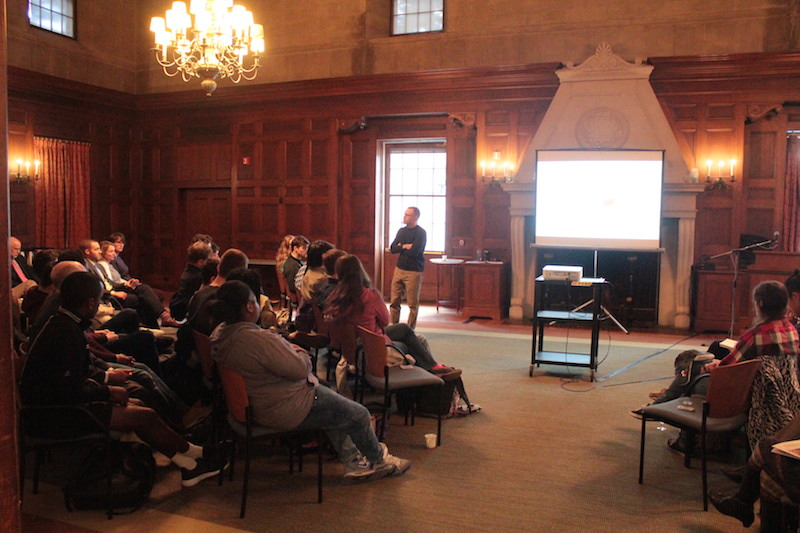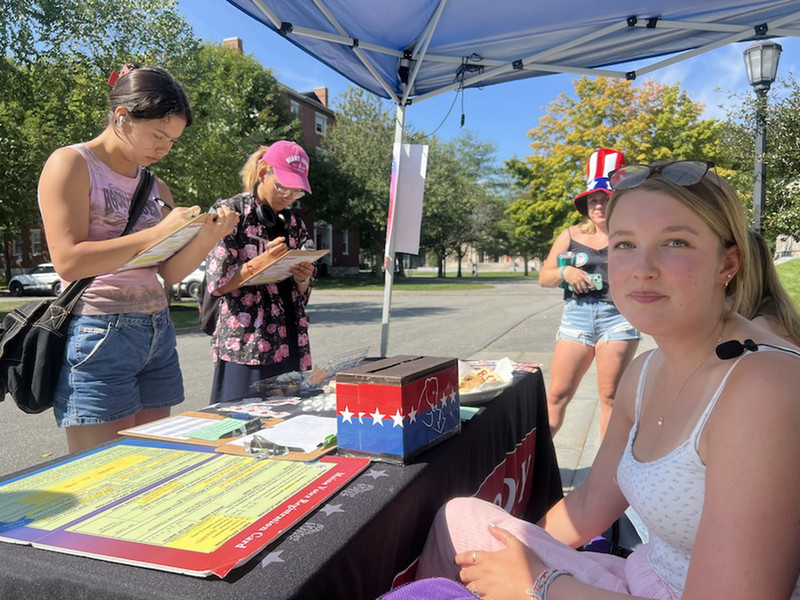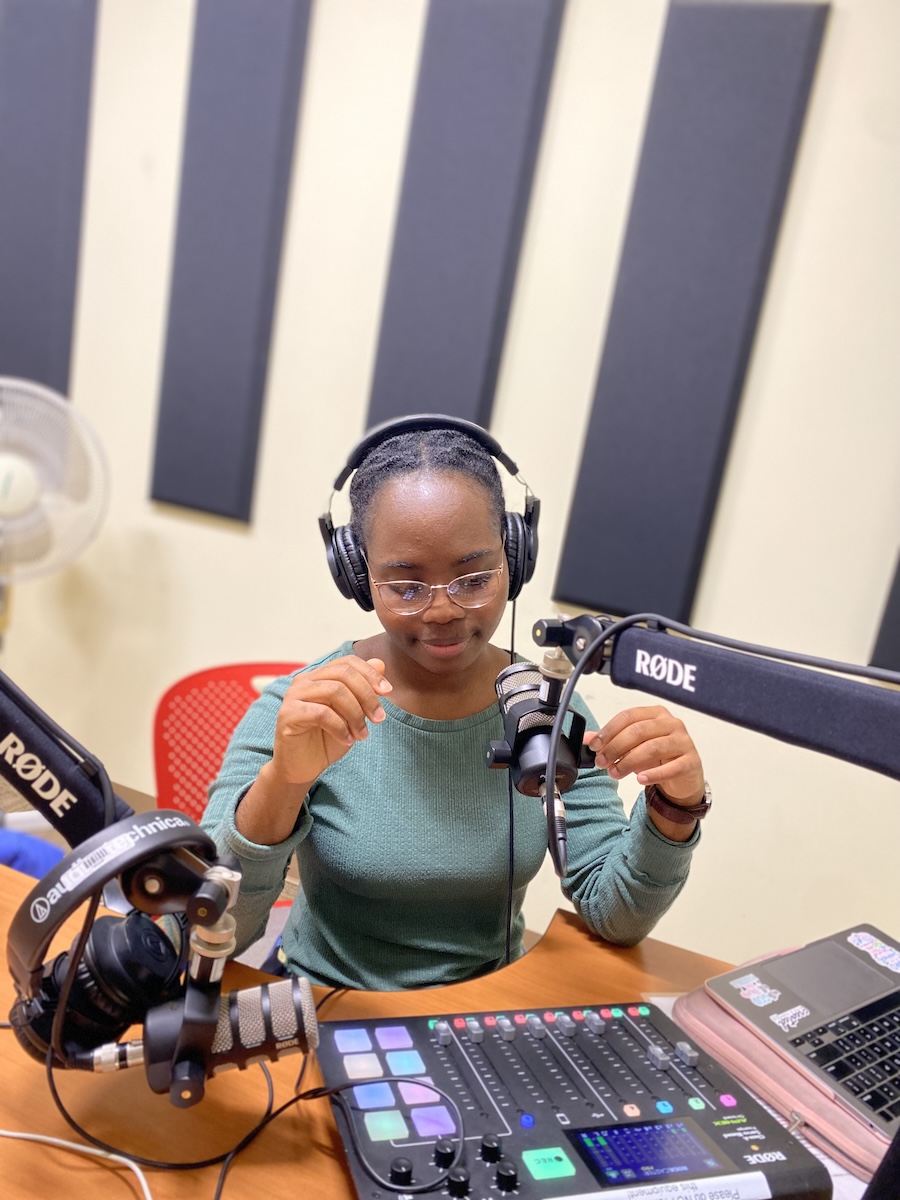A Campus Debate About Anonymous Speech
By Rebecca Goldfine
The McKeen Center hosted a recent forum on anonymous speech in Moulton Union
Expressing an anonymous inflammatory idea has always been possible with a bit of ingenuity via some medium or another — from spraying graffiti on city walls to sending out mailers or tacking up posters around town. These days, however, posting an offensive, or perhaps ill-advised, statement seems to require much less effort. All one has to do is type a few words on Yik Yak, or in a comments section, and hit ‘enter’.”
While some argue that the ability to express a belief online without self identifying provides a way to contribute divergent or anti-conformist ideas, others argue that anonymous speech is a tool too often used for cowardly bullying and harassment.
To hear from students, staff and faculty about the role of anonymous speech at Bowdoin and more widely in the world, the McKeen Center for the Common Good held a conversation last Friday about whether broadcasting opinions, without claiming them publicly, has a place in civil discourse. Professor of Anthropology Sarah Dickey and Assistant Professor of Government and Legal Studies Jeff Selinger moderated the discussion.
The two professors began by polling the audience anonymously (an irony Selinger noted with a bit of humor) about their personal views by asking a series of provocative questions:
- Do you believe students, staff and faculty have a right to say whatever they want anonymously as long as they do not threaten physical violence? At the forum, 42 percent said yes, 36 percent said no, and 22 percent answered not sure.
- Do you feel that you have ever been hurt or harmed by what you have read that has been written online anonymously? At the forum, 54 percent said yes, 38 percent said no, and 8 percent answered not sure.
- Do you believe that an anonymous forum like Yik Yak can play a constructive role in a college community? At the forum, 32 percent said yes, 35 percent said maybe and 33 percent replied no.
Throughout the 90-minute discussion, Selinger and Dickey peppered the audience with other more open-ended questions, including whether people saw a difference between dissenting speech and offensive speech, and whether offensive speech is especially pernicious when it is conveyed anonymously. One of the final questions was whether students, staff or faculty have a right to be protected from offensive speech.
Selinger opened up the discussion by asking why, if we had the choice, we shouldn’t do away with Yik Yak forever. The audience returned with a range of replies.
One student suggested that if people didn’t vent with anonymous speech, they would find other —perhaps more harmful — ways to do this. Another said that anonymous speech can play a positive role on campus, such as, for example, when someone admits they’re sad or anxious. “Kids can find comfort when they see that others struggling with the things they are,” the student noted. Sometimes sympathetic readers post advice or resources the student can turn to as well. In this way, anonymity can generate community and help dispel loneliness.
Another student said he had also observed Yik Yak being used to quickly spread news. He added, wryly, that here at Bowdoin, that important news was often an update that Super Snacks, Bowdoin’s late night munch fest, was offering a special treat of grilled cheese sandwiches. “It’s a mode of communication that students can use to funnel information quickly to as many people as possible,” he pointed out.
Another student said that she had observed Yik Yak being a means for students to express alternative views to the mainstream, perhaps because they felt too intimidated to do so publicly. Selinger expanded on this thought by saying, “So anonymous speech interrupts an apparent consensus.”
Visiting Associate Professor of Computer Science Clare Bates Congdon added her observation that many women who have spoken out about the misogyny in the online gaming culture had been harassed and threatened with harm. “Anonymous speech can give marginalized people a voice, a safe place to speak,” she said.
Michelle Vazquez Jacobus, the McKeen Center’s interim associate director, said that the power of anonymity to vent negative or unpopular criticisms “seems to play an important part of society,” because it raises awareness that these sentiments exist. She questioned, though, “at what point does it feed hostility and negativity? There is the power in the crowd, where you can voice an opinion that you’re not sure you even really hold, and then it’s out there and it begins to gain traction, and suddenly there is a powerful hostility that becomes a majority force whether or not it’s a majority in number.”
A couple of students argued that people have the right to express whatever they want because it’s free speech. However, Jacobus pointed out that there are restrictions on free speech in all areas of our life. “Free speech is a right legally according to the Constitution, but there are limits on it,” she said. She added, “Anonymous speech seems in many ways to not have limits we would impose on something that could become dangerous or harmful.”
Selinger said that the assumption that anonymous speech is protected speech is a very uncertain claim. “The Supreme Court hasn’t spoken about this, and there are very good reasons to believe it is not protected at all,” he said. What if, for example, protecting anonymous speech also shielded donors of political campaigns? he asked.
A student contributed that reading hateful or racist anonymous posts creates a feeling of “general distrust” in the community because he’s not sure who might be the one harboring the mean-spirited messages he has read.
A woman at the talk pointed out that anonymous speech cancels out the possibility of dialogue, which can help people holding different beliefs better understand one another. “Discomfort leads to growth when there is conversation and an opportunity to bridge divides,” she said. “Anonymous speech means there’s a lot of forced listening — it’s not a dialogue.”



